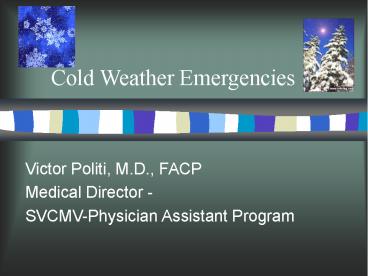Cold Weather Emergencies - PowerPoint PPT Presentation
Title:
Cold Weather Emergencies
Description:
Cold Weather Emergencies Victor Politi, M.D., FACP Medical Director - SVCMV-Physician Assistant Program Frostbite Definitions Primary VS Secondary Primary Normal ... – PowerPoint PPT presentation
Number of Views:940
Avg rating:3.0/5.0
Title: Cold Weather Emergencies
1
Cold Weather Emergencies
- Victor Politi, M.D., FACP
- Medical Director -
- SVCMV-Physician Assistant Program
2
(No Transcript)
3
(No Transcript)
4
(No Transcript)
5
(No Transcript)
6
(No Transcript)
7
(No Transcript)
8
(No Transcript)
9
(No Transcript)
10
Frostbite
11
Definitions
- Primary VS Secondary
- Primary
- Normal thermoregulation
- Overwhelming cold exposure
- Secondary
- Abnormal thermogenesis
- Multiple causes
12
Physiology Heat dissipation
- Radiation (55-65)
- Gradient between environement and exposed body
area. - Conduction (2-3)
- Direct contact with cold substance
- Convection (10-15)
- Wind
- Evaporation (20-35)
13
Physiology
- Above 32?C
- Vasoconstriction
- Shivering
- Basal metabolic rate
- Below 32?C
- No shivering
- Below 24?C
- No basal metabolic rate
14
Mild (gt 32?C)
- Increase metabolic rate
- Maximum shivering thermogenesis
- Amnesia / dysarthria / ataxia
- Loss of coordination
- Tachycardic, tachypneic
- Normal BP
15
Moderate (28 32?C)
- Stupor
- No shivering
- Bradycardic / A.fib
- ? BP ? RR
- Pupils dilated (lt 30?C)
16
Severe (lt28?C )
- Coma
- No corneal or oculocephalic reflexes
- ?? BP
- V.fib (Maximum risk 22?C)
- Apnea
- Asystole
- Areflexia / fixed pupils
- Flat EEG (19?C)
17
(No Transcript)
18
(No Transcript)
19
Osborn (J) Wave
- Mr. John J. Osborn in the early 50s.
- When T?lt 33?C
- 25-30 of patients
- Positive-negative deflection
Osborn JJ Experimental hypothermia respiratory
and blood pH changes in relation to cardiac
function. Am J Physiol 1953 175389.
20
Osborne (J) Wave
- Amplitude proportionnal to degree of hypothermia
- Usually V3-V6
- At junction of QRS and ST segment
Osborn JJ Experimental hypothermia respiratory
and blood pH changes in relation to cardiac
function. Am J Physiol 1953 175389.
21
ECG in Hypothermia
- Muscle tremors artifacts
- Early changes
- Bradycardia
- T wave inversion
- Prolonged PR, QRS and QT intervals
- A.fib when T? lt 32?C
- V.fib when T? lt 28?C
22
(No Transcript)
23
Rewarming methods Passive rewarming
- Endogenous heat production
- Shivering, metabolic rate, TSH, sympathetic,
- Involves decreasing heat loss
- Remove from cold environnement
- Remove wet clothes
- Provide blanket
24
Rewarming methods Active external rewarming
- Heat to body surfaces
- Heating blankets (fluid filled)
- Air blankets
- Radiant warmers
- Immersion in hot bath
- Water bottles / Heating pads
- Less effective than internal rewarming if
vasoconstricted
25
Rewarming methods Active internal (core)
rewarming
- Warm iv fluids
- Warm, humid oxygen
- Peritoneal lavage
- Gastric / Esophageal lavage
- Bladder / Rectal lavage
- Pleural / Mediastinal lavage
- Microwaves (Diathermy)
- Extracorporeal circulatory rewarming
26
Warm iv fluids
- SalineNot RL
- Long tubulure lost of heat
- Can use microwave for saline (No D5W)
- Annals of EM, 1984 and 1985
- 1L of NS to 39?C 2 minutes at high power.
- No microwave rewarming for PRBC
- Hemolysis
- Hemoglobinuria
- Transfusion reaction
27
Warm, humidified O2
- 42?C-46?C
- Prevent heat loss
- Negligible heat gain
- Very important in management of hypothermic
patient - Up to 30 of heat production lost through airway.
28
Gastric/Oesophageal/ Bladder/Rectal lavage
- Not shown to be better than external rewarming.
- Limited surface area
- Limited heat exchange
- Limited utility (!)
- Recommend as last resort when other modalities
not available.
29
Peritoneal lavage
- Fluid at 40-45?C
- Up to 12 L/h
- KCl free
- Hepatic rewarming
- Renal support when dialysate is used
- 2?C-4?C / h
- C.I.
- Abdominal trauma
- Acute abdomen
- Free intra-abdominal air
30
Extracorporeal blood rewarming techniques
- Hemodialysis
- Arteriovenous rewarming
- Venovenous rewarming
- Cardiopulmonary bypass
31
Extracorporeal blood rewarming
- Hemodialysis renal dysfunction
- AV depends on the pts BP
- CPB is the Gold Standard .
- CPB improves long term survival and neurologic
outcome. - 15 of 32 long term survivors and none had
neurologic deficits (7 years later).
B.H. Walpoth and al. Outcome of survivors of
accidental deep hypothermia and circulatory
arrest treated with extracorporeal blood warming,
N Engl J Med, 19973371500-5
32
In The ED - Prethaw
- After stabilizing core temperature and addressing
associated conditions -prepare to initiate rapid
thawing - Protect part
- Stabilize core temperature
- Hydration
- No friction massage
33
In the ED - Thaw
- Rapid rewarming in 38-410 C circulating water
until distal flush (thermometer monitoring) - Requires 10-30 min with active motion of part
without friction massage - Parenteral analgesia
34
In the ED - Postthaw
- Ibuprofen 400mg q 12h
- Tetanus prophylaxis
- Streptococcal prophylaxis for 48-72hr
- Elevation
35
Sequelae
- Neuropathic
- pain
- phantom
- causalgia
- Tabes burning
- chronic
36
Sequelae
- Thermal sensitivity
- heat
- cold
- Sensation
- hypesthesia
- dysesthesia
- paresthesia
- anesthesia
37
Conclusion
- Hypothermia is rare but treatable
- Good outcome after prolonged arrests
- Include Hypothermia in your ? Dx
- Include T? as a 5th vital sign
- Call early to organize CPB if available if
patient in cardiac arrest - Prevention is still the best
38
Other Causes of Hypothermia
39
(No Transcript)
40
(No Transcript)
41
(No Transcript)
42
(No Transcript)
43
(No Transcript)
44
Questions ???































